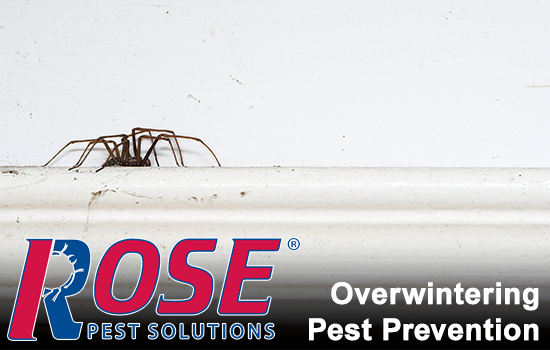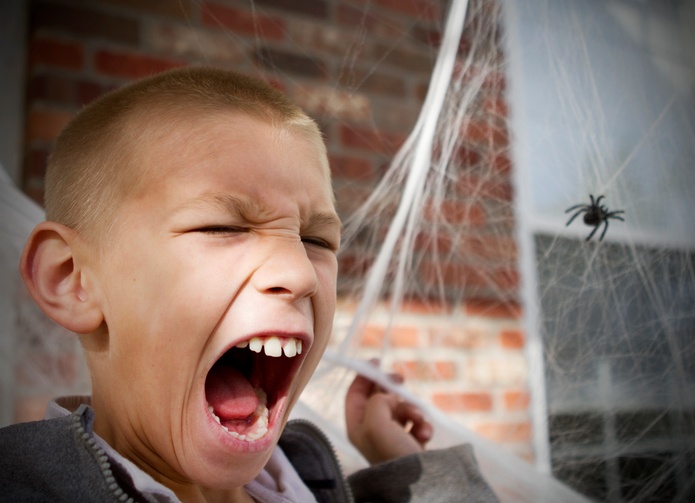The summer is almost over. I know, I’m upset too. But while we still have a few weeks left of warmth and outdoor fun, it’s important to get a head start on pest-proofing your home from those dreaded overwintering pests–spiders, roaches, and rodents. Rose Pest Solutions has the professional scoop on keeping your home free from all of them!
THE ITSY BITSY ICKY SPIDER…
Arachnophobia is one of the most common phobias. They even made that silly film about it! But spiders, for some, can be unbearably creepy. For most people reading this, I’ll put money down on your first response to spiders being something along the lines of, “ew, kill it!” or a scream of terror. And don’t worry, we totally get it. Personally, they creep me out too. However, it’s actually beneficial to your home to leave these guys be if you want some 100% natural pest protection because spiders are predators. Their prey? Other insects! So those creepy crawlies are actually protecting your home from the other pests.
But we get it, they’re still kind of creepy. When you’re vigilant with prevention, overwintering pests like stink bugs, lady bugs, bluebottle flies, and box elder bugs don’t have a chance to get into the tiny access points around your home, which means the predators (spiders in this case) don’t have a food source. Without a food source, the spiders go elsewhere. Two birds, one stone. Hooray!
But since we love our customers–and we totally understand the gross factor–go through this list to make sure your home is spider-proof:
- Make sure door and window screens are serviceable and free of holes and tears. Verify that any cracks or crevices between them and the wall are properly sealed.
- Get rid of as much clutter as possible, and store what you keep in seal-able plastic tubs.
- If you have to use cardboard boxes, use an ‘H’ pattern (across the flaps and both ends) to seal them with packing tape.
- Vacuum up any webs, egg sacs, live and dead spiders, and any dead insects around them with a HEPA filter vacuum and seal them in a container to dispose of.
- Set out glue traps if necessary.
- Check places spiders frequently hide: corners, baseboards, under appliances, in storage areas and closets, underneath shelves and drawers.
These precautions will ensure spiders won’t stick around for long–if they even show up at all. But if you do still have issues, our Integrated Pest Management approach will take care of them.
WHAT ABOUT OTHER PESTS?
Other than the spooky 8-legged critters everyone loves to hate, cockroaches, rodents, and the ever-dreaded house centipede round out the top four kinds of pests who will spend the next few months carefully searching the outside of your home for a warm place to spend the winter.
Curtis Rand, Rose’s VP of Operations, went into a bit more detail:
“From asthma and allergies triggered by cockroaches, to salmonella and food contamination caused by rodents, there are a number of serious health risks associated with fall pests. Similarly, critters like mice and rats can chew through electrical wiring, among other destructive habits, possibly causing a house fire. These potential implications from a pest infestation should be taken seriously, and with consistent pest-proofing, homeowners can help protect themselves against these dangers.”
Even the best and most vigilant pest control won’t work without the help of the client. Our good buddies at the National Pest Management Association (NPMA) are once again dishing out the best tips to prevent overwintering pests in your home and yard:
- Screen attic vents and openings to chimneys.
- Eliminate moisture sites, including leaking pipes and clogged drains.
- Seal cracks and crevices on the outside of the home using caulk and steel wool. Pay close attention to where utility pipes enter the structure.
- Store food in airtight containers and dispose of garbage regularly in sealed receptacles.
- Replace loose mortar and weather stripping around the basement foundation and windows.
- Store firewood at least 20 feet away from the house, and keep shrubbery well trimmed.
- Install door sweeps and repair damaged screens.
- Inspect items such as boxes of decorations and grocery bags before bringing them indoors.
- If you suspect a pest infestation, contact a licensed pest control professional who can properly inspect and treat the problem.
Dealing with overwintering pests is absolutely imperative when it comes to pest management. As you know, we’re all about educating the community. If you’ve read all this and you still want to know how to keep those creepy but useful pests away, don’t hesitate to contact us!




